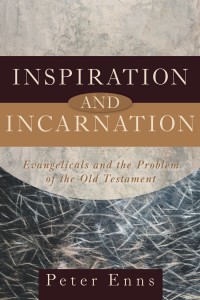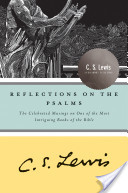
In my last post I highlighted C.S. Lewis’s take on what it means to approach the Bible humbly: namely, we should first ask honestly and with an open mind, What sort of book has God actually given us and how has He given it? When we do that, we find that God has given us a Book not at all like what we might have expected if we had formulated a doctrine of Scripture a priori. Instead He has given us something else entirely, something far more extraordinary:
The same divine humility which decreed that God should become a baby at a peasant-woman’s breast, and later an arrested field-preacher in the hands of the Roman police, decreed also that He should be preached in a vulgar, prosaic and unliterary language. If you can stomach the one, you can stomach the other. The Incarnation is in that sense an irreverent doctrine: Christianity, in that sense, an incurably irreverent religion. When we expect that it should have come before the World in all the beauty that we now feel in the Authorised Version we are as wide of the mark as the Jews were in expecting that the Messiah would come as a great earthly King. The real sanctity, the real beauty and sublimity of the New Testament (as of Christ’s life) are of a different sort: miles deeper or further in.
So says Lewis in the Introduction to J.B. Phillips’s Letters to Young Churches. God’s work in the inspiration of Scripture not only communicates but also emulates God’s humble, self-effacing work in the Incarnation.

As Pete Enns puts it in his fantastic book Inspiration and Incarnation: Evangelicals and the Problem of the Old Testament, the Incarnation of the Son and the inspiration of Scripture are “analogous.” Lewis clearly agrees. In his longest piece on Scripture, Chapter XI of Reflections on the Psalms he writes:
For we are taught that the Incarnation itself proceeded “not by the conversion of the godhead into flesh, but by taking of (the) manhood into God”; in it human life becomes the vehicle of Divine life. If the Scriptures proceed not by conversion of God’s word into literature but by taking up of a literature to be the vehicle of God’s word, this is not anomalous.

According to Lewis the means whereby God gives us Scripture is not by faxing us transcripts of inner-Trinitarian dialogue direct from Heaven, but rather by taking up very human literature and utilizing it to communicate His Divine life to us. As he says earlier in the chapter, “The human qualities of the raw materials show through. Naïvety, error, contradiction, even (as in the cursing Psalms) wickedness are not removed.” Nevertheless, he says, “It carries the Word of God; and we (under grace, with attention to tradition and to interpreters wiser than ourselves, and with the use of such intelligence and learning as we may have) receive that word from it. . . .”
In this way, for Lewis, the Word is also like the sacrament: Ordinary water, bread, and wine are taken up into, become conduits for and communicators of the Divine life that we so desperately need. So, too, here: all too ordinary human writings are taken up into, become conduits for and communicators of the Divine Life and Word. Such a sacramental and incarnational understanding of Scripture impacts the way in which we receive the Word of God in it. Grammatico-historical or historical-critical acumen are not enough, and may not even be necessary. We must receive the Divine Word by approaching Scripture in a sacramental manner. We “receive that word from it,” says Lewis, “not by using it as an encyclopedia or an encyclical but by steeping ourselves in its tone or temper and so learning its overall message.” Or, to put it another way, if the Word is Sacrament, then, as Eugene Peterson puts it, perhaps our task is to recover the art of spiritual reading and (re)learn how to eat this Book; prayerfully consuming and being consumed by these (very) human words, for in them lives the very Word of God.
David Williams serves part-time as an InterVarsity/Link staff on loan to the Oxford Pastorate, an independent evangelical chaplaincy that ministers to graduate students at the University of Oxford. He is currently pursuing his doctorate in Christian Ethics at the University of Oxford, writing on Friedrich Schleiermacher’s, John Henry Newman’s, and Abraham Kuyper’s divergent theologies of higher education and their potential applications to the modern research university. Before moving to England, David served for five years with InterVarsity’s Graduate & Faculty ministries at New York University. David resides in Oxford, England with his wife Alissa and son Charlie.

Thank you for this post. I’ve been attempting to work out my own thinking on the manner in which the Bible speaks. In discovering that Lewis has some opinions on this topic, I was surprised, then delighted, then compelled by his thinking that myth is a rather true and heavenly manner of communication. It’s really very helpful.
I am glad you found it helpful, Bill! Blessings!
I love the writings of CS Lewis. I quote from his writings often in my teaching and preaching. He may have been the greatest apologist of the 20th century. However, I don’t think he ever claimed to be a theologian, and while I have gained much from his apologetics, I would not go to Lewis for my theology. It is difficult to decipher exactly what view Lewis held on the inspiration of Scripture, but it does seem that he is outside of the traditional evangelical view of the “unique divine inspiration, entire trustworthiness, and authority of the Bible.”
I consider David to be a gifted writer and perceptive thinker. However, I am disappointed with the direction he is taking in this blog post on Scripture. To describe the Bible, not as being the Word of God, but as a conduit or vessel that carries or contains the Word of God is the classic vocabulary of Neo-orthodoxy, not the historic evangelical commitment to the Bible. The emphasis on the sacramental and incarnational approach to Scripture inevitably gives it a mysterious and subjective character. In that case, what is important is what it means to you when you encounter it. This does not encourage confidence in the Bible as the clear revelation of God’s message to us.
Everyone recognizes that the process whereby God inspired the writers of the Bible to deliver the true intent of God’s revelation has some mystery to it. There is both a human and divine element in inspiration. However, what is clear is that the Bible claims for itself that the result is the actual revelation of God, the very words of God to us which is trustworthy and authoritative (II Peter 1:19-21)
For more than 70 years, InterVarsity has been training students in the inductive approach to Bible study. One of my greatest joys has been to see the eyes of students light up when they realize they can actually read and understand and apply the Bible for themselves. This approach assumes that the Bible provides an objective, clear, message that we are to discover and apply. To suggest, as David does in this article, that the grammatico-historical method of interpretation is not enough or may even not be necessary, places us in the quagmire of subject interpretation, rather than the sure confidence that the Bible is God’s Word to us.
As I have said to David privately, and now say in a more public forum, please turn your attention to taking on different battles. There are already plenty of voices in the university world that seek to shake students’ confidence in the Bible. As campus ministers, we need to show why we can be confident that the Bible is God’s true revelation to us regarding his nature, his work in history, and his plans and purposes in this world.
…this involves the belief that Myth in general is not merely misunderstood history (as Euhemerus thought) nor diabolical illusion (as some of the Fathers thought) nor priestly lying (as the philosophers of the Enlightenment thought) but, at its best, a real though unfocused gleam of divine truth falling on human imagination. The Hebrews, like other people, had mythology: but as they were the chosen people so their mythology was the chosen mythology—the mythology chosen by God to be the vehicle of the earliest sacred truths…
The quote above from Lewis indicates that his understanding of myth was not that of a neophyte. First disparaging the negative views of fathers ancient and modern, he goes on to call myth the conveyance of “divine truth” and “sacred truths”. There’s a lot packed into that paragraph. What I find compelling is that Lewis understood the objective matter of revelation, calling it truth, and also was not threatened by its subjective focus. Does Lewis mean something mysterious in his use of the word “truth”?
I feel the discomfort with terms such as conveyance or vehicle. We do affirm that the Writings themselves (in the autographs) are the very word of God. Does such language lead us to a sacramental or incarnational view of Scripture? If it does, we may do well to take notice, because, while we eschew sacerdotalism and mysticism, sacramentalism properly practiced is exactly the projection of God’s objective truth into our wobbly, subjective world. Equating sacramentalism with mysticism originates from low view of sacramentalism. As a litmus test, with the verse we call the “great commission” what proportion of our exhortation is on the baptism part compared to the go-make-disciples part?
But I agree that “unfocused gleam of divine truth” is a bit hair-raising. It may take some getting used to.
Daniel above finds joy in realizing that students “can actually read and understand and apply the Bible for themselves.” That sentence seems like a healthy mix of the objective and subjective. But the focus seems to be on the subjective. I’d like to hear back from Daniel on this. Is it sinister that Lewis wants to highlight that
“The story of Christ demands from us, and repays, not only a religious and historical but also an imaginative response. It is directed to the child, the poet, and the savage in us as well as to the conscience and to the intellect…”
One part of our calling as Christians to contend against unbelief in the church; we all want to kill sharks in the pool. If the weapons of our warfare are only modern notions of inspiration, infallibility and grammatical historical exegesis the armor may be a little thin. If we intellects want to paint ourselves into a corner with our 21st century notions of inerrancy then we may find ourselves…in a corner.
Lewis wants to open us up and get us out of our little corner where we are mostly talking among ourselves in our own derived language. If his appeal to our imagination is seen as a neo orthodox bowing to the subjective, then maybe he’s been misunderstood, or maybe we need to bow a little to the subjective element in Bible reading. The important thing I think is to understand that there is nuance, there is hard work and there is humility involved in correctly reading an ancient, highly sophisticated piece of literature that was written over a long stretch of time by many human authors. And has a long, rich history of interpretation. Silva in his book “Has the Church Misread the Bible” addresses the parochialism that often attends an inquiry that assumes its own “modern” hermeneutic is the definitive and finally true one.
Is there something insufficient about
“All Scripture is breathed out by God and profitable for teaching, for reproof, for correction, and for training in righteousness, that the man of God may be complete, equipped for every good work.”
This seems like a fuller accounting of Scriptural authority, supremacy and uniqueness than what we get from derived formulae that are easily misperceived. If I’m going to be ridiculed, I want it to be for the right reasons.
Bill, thank you for you response. I am not sure that I understand all of the nuances of your comments. However, I will comment on what I meant by teaching students to study the Bible inductively. We assume that the authors of the Bible (both human and divine) had something in particular that they intended to say. Our job is to discover the author’s intent. We seek to discover the true interpretation of a passage. This involves objective study of the grammar, history, context, literary genre, etc. It also involves a consideration of the history of interpretation so that we are not lone ranger interpreters. Once the essential meaning is carefully derived, we then draw applications based on this interpretation. This is the subjective element, but it is not pulled out of the air. It is based on a careful study and interpretation of the text. It seems to me that the alternative is an “anything goes”, what-it-means-to-me, approach to Bible interpretation where we impose our own ideas upon the Bible as opposed to submitting to the authoritative Word of scripture.
Concerning the various derived formulae for the doctrine of scripture, I agree that they can be misunderstood. It can be more helpful to site a passage like II Tim 3:16-17. But there are several other key passages to consider in describing the claims that scripture makes about itself, such as II Peter 1:12-21, Matt 5:17-20, Ps 119, which further inform our view of scripture.
I should come here more often. Daniel’s experience with students could be helpful to us. We’ve discovered a college in our town, it seems like a small, elite, kind of junior ivy league place. From a walk around campus it seems pretty insular, and there isn’t much evidence of Christian stuff going on. The website shows an open the door for spiritual pursuit, and we would be encouraged to approach and work with students/faculty if we had a method. Does Daniel or anyone else have anything for us on that topic?
Bill, this is this kind of inquiry we in InterVarsity love to receive. It is perhaps second only to the student who asks, “How could I become a Christian.” If you can let us know the name and location of the college in your community, we would be happy to put you in touch with a wide range of resources. This would include the closest InterVarsity staff member, possible contact with Christian faculty, and written and online materials with strategies and approaches for establishing and building a Christian witness on campus (InterVarsity.org). InterVarsity is involved on 530 campuses across the country with 38,000 students and faculty involved. It sounds like you have a sensitivity and burden for this kind of ministry in your community and we would be delighted to help. We can proceed with this off-line if you like. I am sure that our blog-meister can arrange it.
Yes, I would love to create a connection 🙂 Just drop an email to me via http://www.intervarsity.org/contact/emerging-scholars-network.
I used the link below offline and haven’t heard, maybe something is broken. I’d love to hear more about what Intervarsity has to offer for Christian outreach on the campus of Franklin and Marshall College in Lancaster, PA.
Dear Bill, Please forgive me for not replying sooner. I saw the email and was thinking about how to be in touch and with whom to connect you. I live in the area. I’m dropping you an email ASAP. In Christ, Tom
As usual, Lewis dives beneath the surface (“Is it inerrant or not?”) and finds something far more significant. Thank you for this analysis.